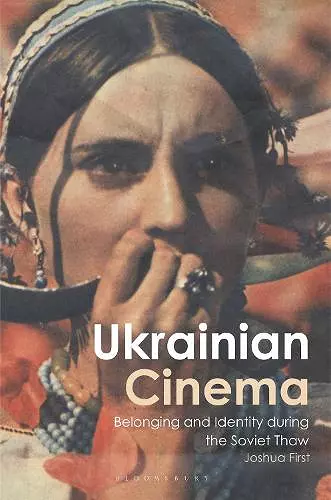Ukrainian Cinema
Belonging and Identity during the Soviet Thaw
Format:Hardback
Publisher:Bloomsbury Publishing PLC
Published:6th Jan '15
Currently unavailable, and unfortunately no date known when it will be back

In this insightful study, historian Joshua First examines Ukrainian Poetic Cinema during the Soviet 1960s-70s, focusing on identity, cultural differences, and the impact of key filmmakers and their works.
In Ukrainian Cinema: Belonging and Identity during the Soviet Thaw, historian Joshua First offers an in-depth examination of Ukrainian Poetic Cinema from the 1960s to the 1970s within the context of Soviet cultural politics. This work is notable for being the first comprehensive study of Ukrainian cinema available in English, shedding light on the complex interplay between national identity and artistic expression during a pivotal era. First argues that filmmakers at the Alexander Dovzhenko Feature Film Studio in Kiev were deeply engaged with questions of cultural identity, striving for recognition of Ukraine's unique cultural heritage by both the Soviet film industry and its audiences.
The book begins with two chapters that outline the historical backdrop of Soviet cinema, particularly how it portrayed Ukrainians in a domesticated and exoticized manner since the Stalin era. First highlights the efforts of the Dovzhenko studio in the early 1960s to reposition itself as a leading force in the cultural thaw occurring across the USSR. This context sets the stage for understanding the emergence of Poetic Cinema, which sought to challenge existing narratives and elevate Ukrainian stories.
The subsequent chapters delve into the works of prominent filmmakers, including Sergei Paradjanov and his influential film Shadows of Forgotten Ancestors, which played a crucial role in shifting the studio's focus toward an auteur-driven approach. First also examines the contributions of filmmakers like Yurii Illienko, Leonid Osyka, and Leonid Bykov, who navigated the tension between artistic ambition and the commercial pressures of the Soviet film industry. Through this exploration, Ukrainian Cinema provides valuable insights into the cultural landscape of Soviet Ukraine and the enduring quest for identity and belonging in cinema.
Ukrainian Cinema is making a great addition to a still small – but hopefully growing – body of work that will break the pattern which uncritically equates Soviet and Russian cinemas and either "Russifies" or keeps the cinemas of the former republics in the shadow. * CEU Review of Books *
ISBN: 9781780765549
Dimensions: unknown
Weight: 573g
264 pages